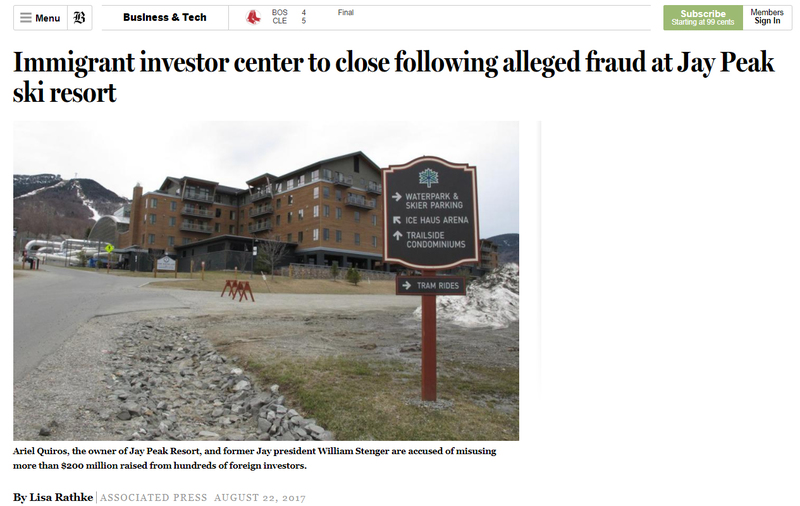Immigrant investor center to close following alleged fraud at Jay Peak ski resort
Ariel Quiros, the owner of Jay Peak Resort, and former Jay president William Stenger are accused of misusing more than $200 million raised from hundreds of foreign investors.
US Citizenship and Immigration Services intends to close Vermont’s immigrant investor regional center following alleged fraud at Jay Peak ski resort involving millions of dollars from the investor program, according to documents released Monday by Republican Governor Phil Scott.
Ariel Quiros, the owner of Jay Peak Resort, and former Jay president William Stenger were accused last year of misusing more than $200 million raised from hundreds of foreign investors through the EB-5 visa program for developments at or near the ski resort.
The USCIS said in an Aug. 14 letter to the state that it intends to close the center because it no longer serves the purpose of promoting economic growth by failing to properly manage, monitor, and oversee EB-5 projects. It also said it appears that the center’s project managers used EB-5 funds for purposes unrelated to the job creating business activities for new commercial enterprises and job creating enterprises.
‘‘Certainly better Regional Center oversight of the projects may have prevented this,’’ the USCIS said.
Scott said Monday that he directed the Vermont Department of Financial Regulation to review the center’s operations in July, after a court approved a settlement with the financial firm Raymond James to reimburse Jay Peak and Burke Mountain creditors.
‘‘The alleged fraud at the Jay Peak projects was devastating for the region, investors and contractors, and has had a lasting impact on Vermont,’’ he said. ‘‘It was critical as a new Administration to have an accounting of the lessons learned, as well as an analysis that could inform whether to continue or end operations of the Vermont Regional Center.’’
In the state report released Monday, DFR Commissioner Michael Pieciak, working with Michael Schirling, secretary of the Agency of Commerce and Community Development, which manages the center, concluded that the state now has stronger regulatory, compliance and oversight measures in place after taking corrective actions in 2014.
But it recommended winding down the center and eventually closing it, and said the function is best performed by a private entity.
‘‘It is our hope that USCIS will agree with our approach for a staggered closure to minimize any adverse economic impact and ensure investors in existing, viable projects are protected,’’ said Schirling.
Stenger has settled civil charges with the US Securities and Exchange Commission. Quiros’s lawyers have said he will be cleared of any wrongdoing.
Mentions
- Vermont EB5 Regional Center
- Ariel Quiros
- Bill Stenger
- Jay Peak - Q Burke Mountain Resort, Hotel and Conference Center L.P.
- U.S. Citizenship and Immigration Services
- The AM Wealth Management Group of Raymond James
- UNITED STATES SECURITIES AND EXCHANGE COMMISSION
- Vermont Agency of Commerce and Community Development RC
Litigation Cases
- State of Vermont vs Bill Stenger & Ariel Quiros
- UNITED STATES SECURITIES AND EXCHANGE COMMISSION vs Ariel Quiros & Bill Stenger
States
- Vermont
Videos





Subscribe for News
Site Digest
Join Professionals on EB5Projects.com →
Securities Disclaimer
This website is for informational purposes only and does not constitute an offer or solicitation to sell shares or securities. Any such offer or solicitation will be made only by means of an investment's confidential Offering Memorandum and in accordance with the terms of all applicable securities and other laws. This website does not constitute or form part of, and should not be construed as, any offer for sale or subscription of, or any invitation to offer to buy or subscribe for, any securities, nor should it or any part of it form the basis of, or be relied on in any connection with, any contract or commitment whatsoever. EB5Projects.com LLC and its affiliates expressly disclaim any and all responsibility for any direct or consequential loss or damage of any kind whatsoever arising directly or indirectly from: (i) reliance on any information contained in the website, (ii) any error, omission or inaccuracy in any such information or (iii) any action resulting therefrom.



